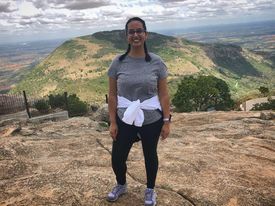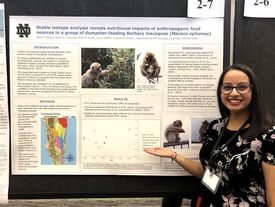Eck Institute for Global Health Fellow, Sana Saiyed, discusses her educational journey, research on human-primate interactions, and personal goals for the future. Sana is currently a PhD student in Notre Dame’s Department of Anthropology.

Tell us a little bit about your area of study. How and when did you first become interested in the field?
I study human-nonhuman primate interactions and the impacts of those interactions on the humans and nonhumans involved. I’ve always had an interest in science and anthropology, but what really solidified my decision to pursue primatology from an anthropological perspective was my work at the Lincoln Park Zoo in Chicago, Illinois. I collected data on Japanese macaque behavior for a long-term behavioral study, so I watched macaques for hours on end. Their social behaviors fascinated me, but I was particularly interested in how they interacted with zoo guests and how those interactions fed into their own intraspecies social interactions. This reminded me of the human-monkey interactions I observed when visiting family in India, and I knew that’s what I wanted to study!
What are you currently working on, and what do you hope to accomplish with it?
My dissertation project looks at the human-langur interface in Gujarat, India, by exploring how human cultural elements, like religion, influence human-langur interactions and how human and langur biology are affected as a result. In India, monkeys are associated with the Hindu god, Hanuman, and are often provisioned as a means of devotion. This has ultimately led to monkey behaviors such as crop raiding and food stealing, and therefore, increased negative interactions with people. It seems that monkeys are losing their association with Hanuman because of these increasingly negative interactions, and my project seeks to understand the behavioral and health outcomes of this cultural change. I also plan to work alongside forestry officials to help implement culturally informed wildlife management tactics based on the project’s data. I hope my work adds nuance to the current primatological research on human-nonhuman primate relationships, especially as they relate to behavior, biology, and health.

What is one of your favorite classes and why?
One of the best classes I’ve taken at Notre Dame was with my advisor, Dr. Lee Gettler: Physiology & Health in Social and Ecological Context. Learning about how various social factors, even our economic and political realities, impact human and other primate health was super fascinating and eye-opening!
Do you have any plans for the future? If so, what are they?
Ideally, after completing my PhD I would like to teach at a smaller college or university while conducting human-wildlife research with the National Park Service.
Can you tell us a fun fact about yourself, or something you enjoy doing in your free time?
A pretty random fact about me is that I have a group of friends that I met on a Harry Potter chatroom in 2004…16 years ago. Somehow we all managed to not be catfishing each other, and we all try to meet up pretty regularly. They’re actually some of my oldest and best friends – and provide me with unwavering support as I navigate my research!